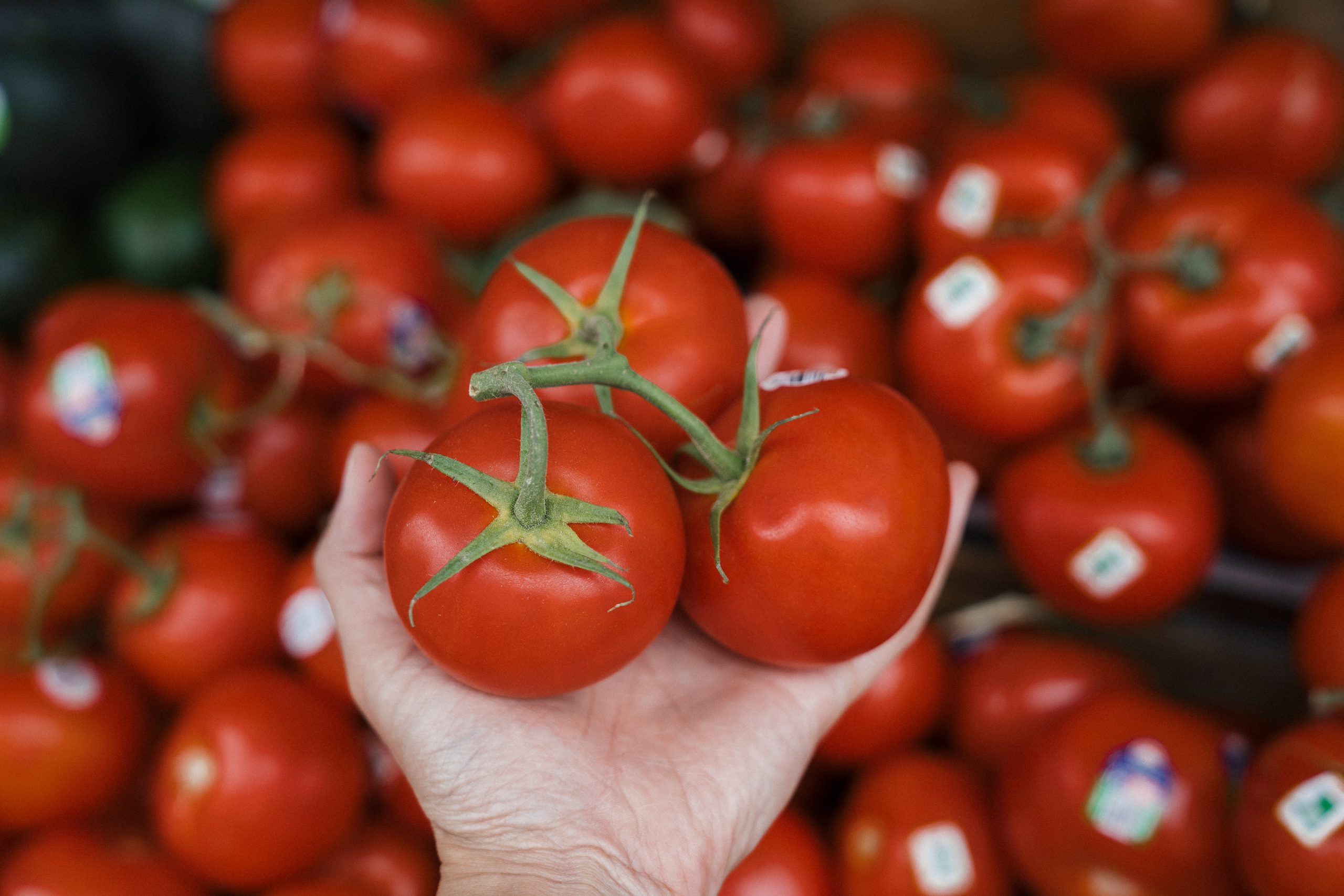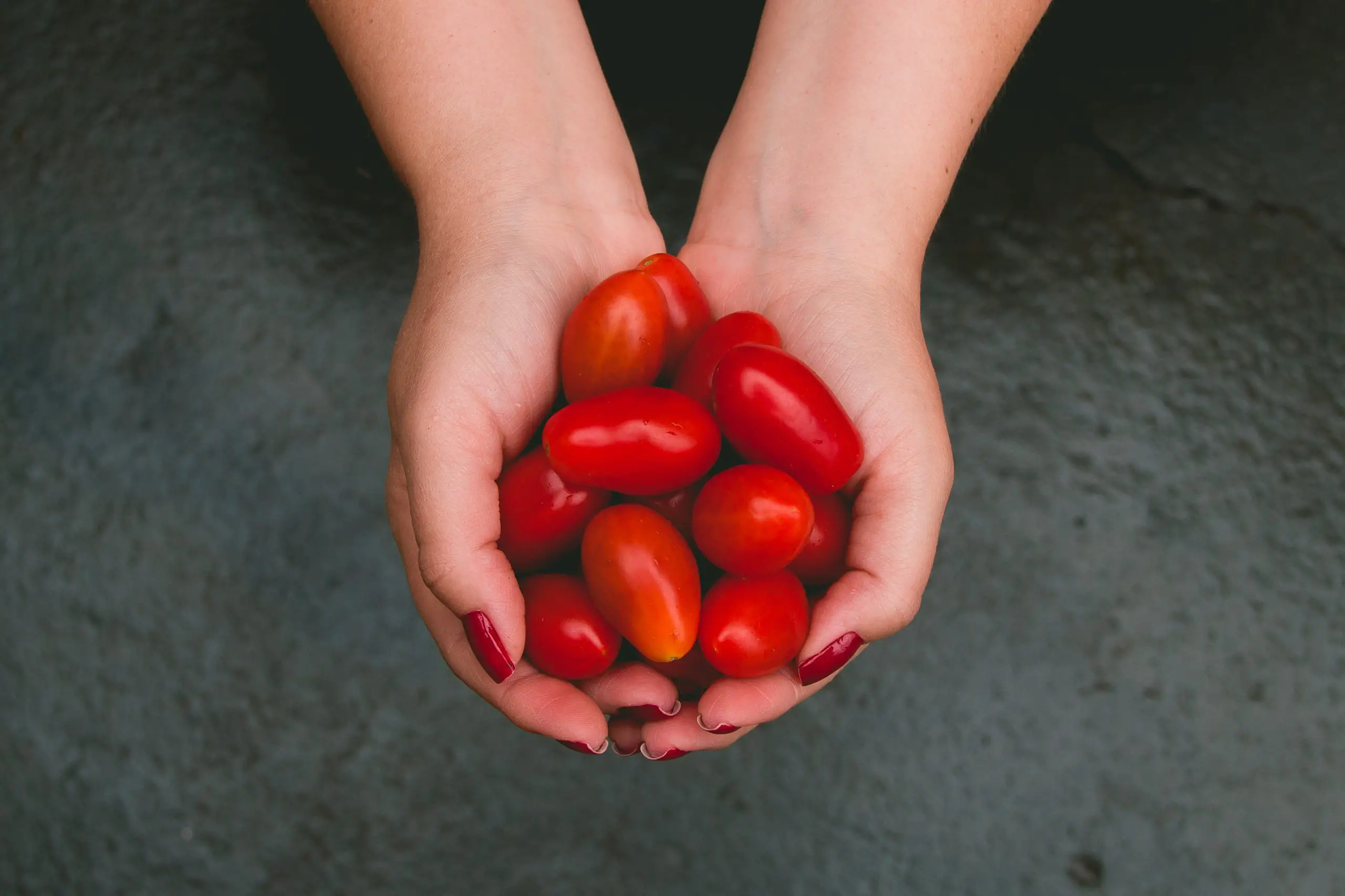Whether you’re wondering how long tomatoes last in the fridge or trying to figure out how to store your fresh harvest, there are a few important things to know. You’ll want to keep your tomato juices in the refrigerator at a low temperature and in a closed container.

How Long do Tomatoes Last in the Fridge?
Since it depends on how you keep them and how they are stored, there is no definitive answer about how long tomatoes last. Fully ripe tomatoes typically stay on the counter for up to seven days, but chilling will extend their shelf life by two weeks.
Tomatoes can be stored in the refrigerator to extend their shelf life to around two weeks if you want to get the most use out of them. In addition, unless you want to run the danger of developing health issues, you should avoid attempting to eat a tomato older than two weeks.
The situation is a little bit different with tomatoes in a can. Tomatoes in cans can remain unopened on the counter for 12 to 18 months. This is ideal if you want to utilize tomatoes for sauces but are unsure how much you would use at once or need.
However, once the can of tomatoes has been opened, you should be sure to consume them as soon as possible because you only have around seven days to use them. After all, tomatoes rot quickly, and their shelf life is dramatically reduced when pressed and canned.
How are Tomatoes Stored?
Whether buying fresh tomatoes or storing leftovers, you need to know how to store tomatoes. They are one of the most important ingredients in several recipes and offer several health benefits. But they can also go bad if stored incorrectly.
For about a week, tomatoes can be kept on the counter, but fully ripe tomatoes should be kept in the refrigerator. Keep in mind that storing tomatoes below 55°F can impair the quality of the produce. Here are some tips for storing tomatoes:
- Unripe tomato storage on the counter: Take the tomatoes out of plastic containers. They should be kept in an airtight bowl or basket. The best place for this bowl is out of the sun’s direction.
- Unripe tomatoes in the refrigerator: Unripe tomatoes shouldn’t be placed in the refrigerator because doing so prevents ripening. Unripe tomatoes are still edible, but their texture and flavor won’t be as good.
- Ripe tomatoes should be kept on the counter: Tomatoes should be taken out of plastic produce bags or blister packs. Then, keep them on the counter at room temperature, preferably out of direct sunlight. To prevent bruising and skin breaks, ensure they’re on in a single layer and aren’t touching.
- Ripe tomatoes in the refrigerator: A vegetable saver bag or a vegetable drawer should be used to store ripe tomatoes. Cut ripe tomatoes should be kept in a lidded container. Within three days of cutting, ripe tomatoes can typically be stored in the refrigerator and utilized.
- The proper method for storing overripe tomatoes: The refrigerator is preferable to a countertop for storing overripe tomatoes because the latter can continue to ripen after being placed there.
Additional Tips for Storing Tomatoes for Long Term:
- Once you have removed your tomatoes from the refrigerator, you should check them weekly. If there are any damaged spots, take them out. This will keep the tomatoes from spreading and causing further damage.
- Ideally, tomatoes should be stored at 55 degrees Fahrenheit to prevent cold damage. This is because temperatures below this point halt the activity of enzymes in unripe tomatoes, which may denature their flavor. Storage at this temperature will keep tomatoes fresh for a week or more.
- Tomatoes will also hold up better if they are stored at room temperature. However, this is not the optimal temperature. Your kitchen’s temperature can fluctuate greatly depending on the season. For this reason, you should always bring your tomatoes to room temperature before serving.
What Impacts the Life of a Tomato?
- Temperature and humidity: In hotter climates with high humidity, tomatoes age significantly more quickly.
- Stage of ripening: A tomato purchased from the grocery store that is fully ripened will last much less time than a tomato plucked from a homegrown vine that is still a little green.
- Tomato variety: The variety will determine how long fruits will last. For instance, a plum tomato’s harder flesh will last longer than a beefsteak. The way your tomatoes are kept will impact how old they become. You can puree or blanch tomatoes that are starting to mush, then freeze them for up to 18 months.
Can Tomatoes be Refrigerated?
Whether you’re storing a large batch of tomatoes or a few pounds here and there, refrigeration is not always the best way to go. While it may seem like it will preserve your tomatoes for longer, refrigeration can hurt the quality of your tomatoes.
One study conducted in Germany found that refrigerating your tomatoes doesn’t improve their flavor. They tested a variety of room-temperature and refrigerated tomatoes. The results were pretty conclusive. They found that the only difference in taste was a slight amount.
Another study by the University of Florida Horticultural Sciences Department tested commercial and unripe tomatoes. It found that tomatoes stored at less than 55 degrees Fahrenheit were susceptible to chilling injury, a term that describes how a cold temperature disrupts the ripening process of tomatoes.
Can Tomatoes Spoil?
Yes, tomatoes do expire, just like any other food that you keep in your home. However, with appropriate storage, you can increase its shelf life. Fresh tomatoes are typically kept on your counter for up to seven days and for two weeks in the refrigerator.
Can you Dehydrate Tomatoes?
You can dehydrate your tomatoes. Before drying your tomatoes, you will want to ensure they are clean. Rinse them thoroughly and wash your hands. You should also sanitize your counter and equipment before beginning. Once you’ve sanitized your supplies, you’ll need to cut your tomatoes into small pieces.
Depending on the size of the tomato, you can either slice them thinly or cut them into wedges. The thickness of your slices will determine how quickly they dry. If you’re using smaller cherry tomatoes, you’ll be able to cut them in half. If you’re using larger plum or Roma tomatoes, you’ll want to chop them into 1/4-inch-thick slices.
Is it Safe to Refrigerate Ripe or Unripe Tomatoes?
The question of whether to refrigerate unripe or ripe tomatoes is a tricky one. Although both fruits need cold to ripen, storing unripe tomatoes in your refrigerator can hasten the spoiling process. Also, leaving unripe tomatoes in your fridge can lead to a lack of taste.
The best way to store tomatoes is to put them in an airtight container that allows for airflow. To preserve ripe tomatoes, it’s a good idea to refrigerate them in a vegetable drawer or crisper in your refrigerator. Alternatively, you can leave them out at room temperature. Just make sure that they are out of direct sunlight and out of the freezer.
How do you Tell if a Tomato is Bad?
If the tomatoes on your kitchen counter have already ripened, your senses will let you know. Here are three indicators that your tomatoes aren’t fit for consumption.
1. Try it Out for Smells:
You can use your sense of smell to determine whether your tomatoes are fresh or already spoiled. Smell the tomatoes after gathering them all together on your counter. Consider tossing them in your garbage if they smell sour, moldy, or odd, especially near the stem.
Examine how it Seems:
Examining the appearance of your tomato can also help you determine whether it has gone bad. Cracks, mold stains, and discolored regions are frequently found on poor tomatoes. So, if you have one, throw that tomato away.
Tomatoes that are too ripe may begin to crack and leak. Use right away; often, since the texture is softening at that point, they work best in prepared foods. I’ve often sliced around a tiny bruise or sunken region so that I could still use a good portion of the tomato, but if your stomach is delicate, avoid consuming a tomato that appears to have been damaged.
Squeeze, but do not Press:
You can always trust your sense of touch to tell if your tomatoes have become rotten. While maintaining a light hold, be careful not to press them too tightly. The tomatoes you’ve stored have gone bad if the flesh sinks in and your fingertips give way to very soft tomato flesh.
Conclusion
Whether you’re looking for a great snack or you’re an expert chef, dehydrating tomatoes is an easy way to preserve their bright summer flavor. You can use your tomatoes in various ways, from soups and salad dressings to pizzas and hamburgers.
Whether you are putting your tomatoes to good use or simply looking to prolong the life of your favorite summer fruit, there are several factors you should take into consideration. In addition to preventing mold, refrigerating your fruits and vegetables will help to maintain their color and flavor.

